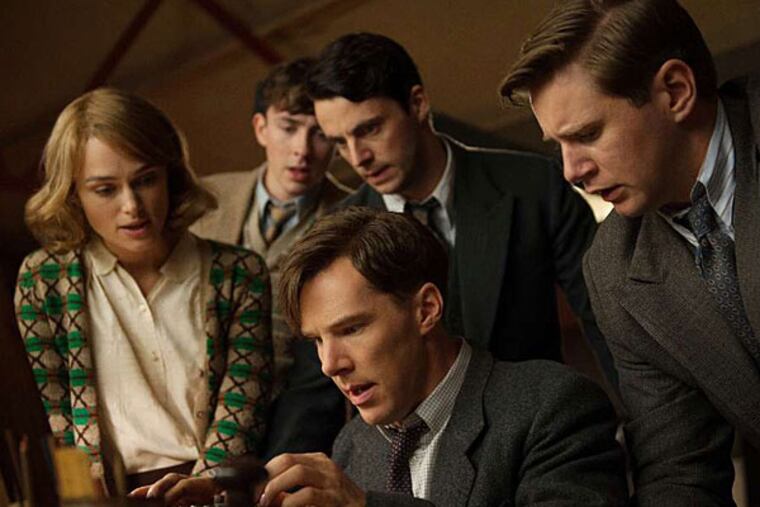'The Imitation Game' honors wronged WWII hero Alan Turing
The Alan Turing brought beautifully to life by Benedict Cumberbatch in The Imitation Game is all contradiction: self-aware and confident, bumbling and socially inept; sensitive and searching yet aloof and arrogant; a marathon runner who finds himself gasping for nervous breath in conversation; a genius at mathematics who can count his friends on the digits of one hand.

The Alan Turing brought beautifully to life by Benedict Cumberbatch in The Imitation Game is all contradiction: self-aware and confident, bumbling and socially inept; sensitive and searching yet aloof and arrogant; a marathon runner who finds himself gasping for nervous breath in conversation; a genius at mathematics who can count his friends on the digits of one hand.
Adapted from Andrew Hodges' doorstop biography Alan Turing: The Enigma by screenwriter Graham Moore and director Morten Tyldum, The Imitation Game tells the true tale of Turing's time at Bletchley Park, the estate outside London where British Intelligence ran its code and cypher operation in World War II, trying to crack the Enigma machine - an encryption device central to the Nazis' communication system. Londoners huddled in the Underground, quaking as Luftwaffe bombs decimated their homes. If MI6 could break the code - with its millions of variables, its daily changeups - Hitler could be defeated and Britain saved.
So why does The Imitation Game begin in 1951 in the Manchester home of Turing, by then a university math professor? Who ransacked his effects? And why is he being carted off by the police for interrogation?
That's the other story - also true - in this affecting film, produced with a Masterpiece Theater eye for period detail, but also with a missionary's zeal to honor a wrongly dishonored man. Turing was a closeted homosexual, arrested for "acts of indeceny" and given a choice in a country where homosexuality was illegal (until 1967): Either go to prison, or take drugs that would render him impotent, a chemical castration. He chose the latter, to grievous conclusion.
The Imitation Game toggles back and forth between these two periods, and another, formative stage: Turing at boarding school, falling in love with another boy - a first love with all its passion and poetry, bounding camaraderie, and, ultimately, crushing disappointment. (Tyldum found a Cumberbatchian teen, Alex Lawther, for these flashbacks; the young actor is vital to the film's cumulative portrayal.)
If the trailers for The Imitation Game barely reference this central aspect of Turing's history - who he was - chalk that off to marketeering deception, or cowardice. The film itself doesn't shirk, though, bringing perky Keira Knightley into the picture with her tweedy coats and cozy cardigans to play Joan Clarke, one of Bletchley's few women whizzes. In the film's tweaked version of Clarke's recruitment, Turing is dazzled by the young woman's cryptanalytic chops; the next thing you know she has joined the boys at "Hut 8" (Matthew Goode, Allen Leech, Matthew Beard), working with, and wondering about the sanity of, Turing.
The scene midway through The Imitation Game in which Turing proposes marriage to Clarke - despite his confessed homosexuality, which she suspects - is heartrending and wonderfully done. Here are two kindred souls whose intellects buzz with electricity. Damn the sex, we belong together anyway, they just about say.
Clarke, Turing, and his team had their cryptographic breakthroughs, and they were momentous, arguably bringing about a quicker end to the war. The struggle to get to that point - the false leads, the equations, the admonishments of military intelligence brass (Charles Dance, Mark Strong) - is conveyed with Hollywoody a-ha! moments and tick-tocking suspense.
It's a good story, a sad story, a story of triumph and prejudice and terrible hypocrisy. And Cumberbatch aces it all - another smartly realized but deeply soulful performance from an actor who seemingly can do no wrong.
MOVIE REVIEW
The Imitation Game
*** (Out of four stars)
Directed by Morten Tyldum. With Benedict Cumberbatch, Keira Knightley, Charles Dance, Mark Strong, Matthew Goode. Distributed by the Weinstein Company.
Running time: 1 hour, 54 mins.
Parent's guide: PG-13 (sex, adult themes).
Playing at: area theaters.
215-854-5629 @Steven_Rea